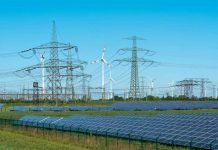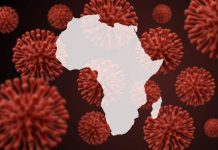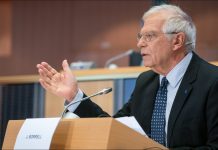PRESS RELEASE
Abuja 5 May 2022 – The European Union (EU) has today pledged to continue to pursue with increased vigour its bilateral engagement and friendship with Nigeria, with a view to delivering better and more results in their partnership. Ambassador Samuela Isopi said the EU and Nigeria’s recent launch of a Joint Ministerial Roadmap and of a seven year Multiannual Indicative Programme for Nigeria aimed to consolidate extant gains of the partnership, while underlining the EU’s commitment to long-term support aligned with its shared priorities, values and interests with Nigeria. She spoke at a press briefing on Thursday, ahead of Europe Day 2022, coming up on May 9.
The Multiannual Indicative Programme for Nigeria 2021-2027 targets projects that reinforce EU’s bilateral cooperation with Nigeria in three focal areas of Green and Digital Economy; Governance, Peace and Migration; and Human Development. The EU is working with its Member States, the European Investment Bank (EIB) and other EU Development Finance Institutions in the implementation of the agreed priorities, as Team Europe.
The EU remains Nigeria’s biggest trading partner, first investor, top donor of humanitarian and development aid, and the biggest diplomatic network. The volume of EU-Nigeria trade stood at €28.7bn in 2021 – 25.8% increase over that of 2020. The EU’s imports from Nigeria stood at €17.5bn, while its exports were valued at €11.2bn, with the trade balance at €6.4bn in favour of Nigeria. The EU is Nigeria’s most important trading partner accounting for 20.9% of Nigeria’s trade with the world. EU is the first export destination for Nigeria, accounting for 25.4% of its exports. EU is second in Nigeria’s imports from the world accounting for 16.1% of its total imports.
Ambassador Isopi referenced the outstanding accomplishments recorded in recent times as the EU and Nigeria ramped up collaborations to address issues of common concerns, leveraging of their strong partnership of equals.
The EU has been providing the lead in efforts to promote peace and security, democratic governance and rule of law, human rights and freedoms, prosperity and decent living at home and around the world. In the face of global challenges like pandemics, security, finding green and digital solutions, climate change and migration, the EU has already proven to be more effective while working with its networks of partnerships across the world.
Together with its Member States, the EU is the biggest donor of COVID-19 vaccines to Nigeria, and has so far gifted it with 20 million doses, representing 61% of all donated vaccines received by Nigeria through the COVAX facility.
Recent high level visits:
- The visit of Executive Vice President of the European Commission, Ms Margrethe Vestager, which focussed on a positive economic, innovation, youth and digital agenda, in line with the outcome and objectives of the EU-AU Summit.
- The EU Election Follow-up Mission (March 2022), led by Ms Maria Arena, Member of the European Parliament and Chief Observer of the 2019 EU Election Observation Mission. The main objectives were to assess the implementation of the EU EOM recommendations and to discuss further reform.
- Maritime Security Mission, led by the EU Senior Coordinator for the Gulf of Guinea, Nicolás BERLANGA. This was to deepen relations with Nigeria on maritime security and explore the possibility of developing a strategic partnership with Nigeria in this domain.
- The 6th EU-AU Summit held in Brussels on 17-17 February 2022 brought together EU and African Heads of State and Government, including President Muhammadu Buhari.
Other examples of EU engagement in Nigeria:
- Working with the Nigerian authorities to end the security challenges across the country. We are supporting government’s efforts to fight terrorism, radicalization and violent extremism as well as the reform of the criminal justice system.
- Providing multi-faceted supporting to Nigeria’s democratic process since 1999. The EU’s support aims to strengthen key democratic institutions including INEC, the National Assembly, the Civil Society and the Media. The EU has consistently deployed an Election Observation Missions (EU-EOM) in each of the general elections.
- Over 60 per cent of Nigeria’s population is under 25 years. The youths have, therefore, been a central feature of EU’s support across all priority areas. The EU has progressively increased the number of young Nigerians selected to study in various European universities under its flagship education programme, ERASMUS+ in recent years. 134 youths were selected in 2021.
- The EU takes the lead in promoting human rights and freedoms. Nigeria is one of the pilot countries for the EU-UN Global Spotlight Initiative, a multi-year joint effort to eliminate all forms of violence against women and girls by 2030. An initial investment in the order of €25 million was made to Nigeria.
- Under the current financial framework, the EU has allocated near €508 million to projects supporting inter alia social, economic and political governance in Nigeria.
- The EU is the leading contributor of humanitarian aid in Nigeria, providing assistance to meet the basic needs of the most vulnerable groups, including internally displaced persons and others affected by the conflict in the North-East as well as victims of natural disasters. Since 2014, the EU has provided more than €390 million to help people in need in Nigeria. The EU humanitarian aid supports emergency food aid, shelter, access to clean water, hygiene and sanitation, basic primary healthcare, protection and education.
- The EU has a long tradition of working with the Government of Nigeria to increase economic growth and expand social equity. Besides the traditional development cooperation with the government, the EU has put in place new instruments of engagement with the private sector aimed at creating jobs, growing an inclusive economy and generating wealth and prosperity. These initiatives build on the country’s entrepreneurial potential, by facilitating private capital investments in high-impact sectors such as agriculture, renewable energy, information and communication technology (ICT) and social enterprise. The EU has invested over €150 million in support of Nigeria’s energy sector in the current funding cycle.
For press inquiry, please contact: Modestus CHUKWULAKA, Press Officer, Delegation of the European Union to Nigeria, Abuja.
Phone: 09-4617800-7; Mobile: 0803 311 3017; email: Modestus.Chukwulaka@eeas.europa.eu

























